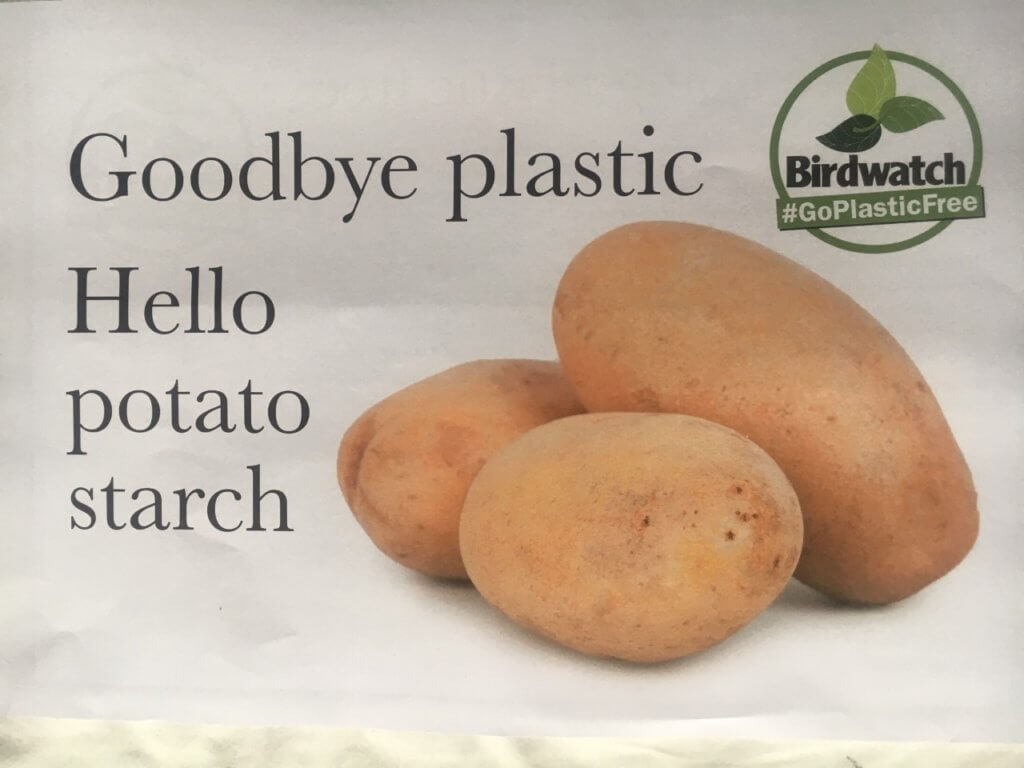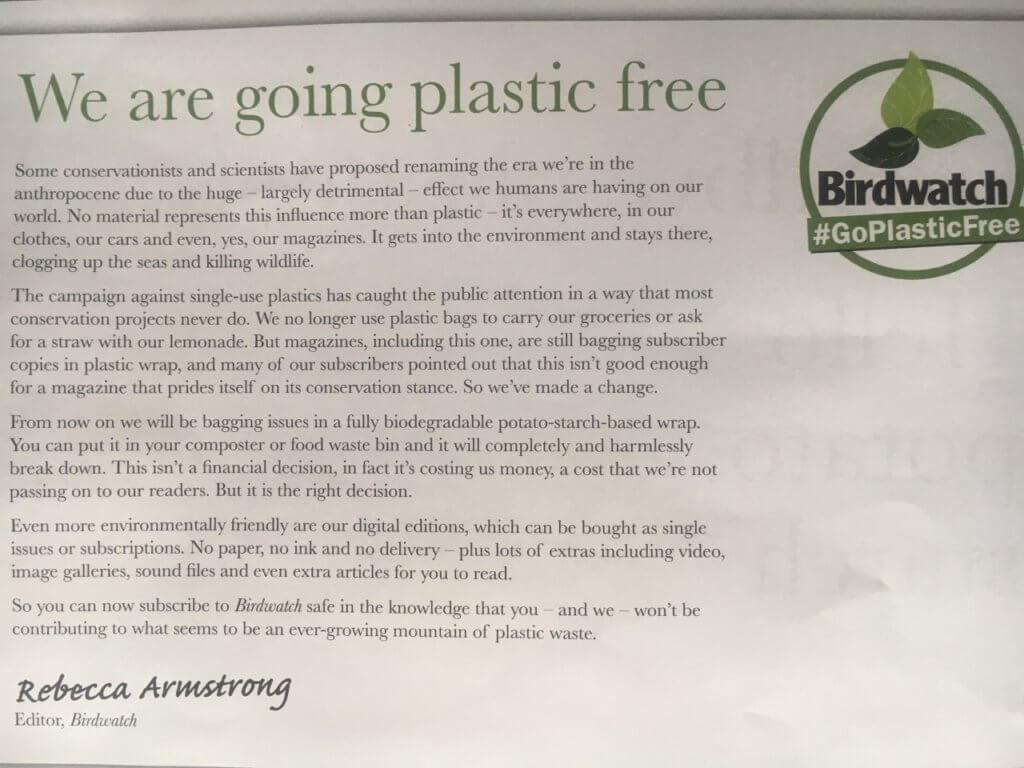
The wrapper on my March Birdwatch magazine looked different… and it is.
I’m glad to see that Birdwatch alongside many other magazines, but far from all of them, has switched away from plastic wrappers and, in this case, to potato starch.
Good for them!
And although I am sure that the managing editor, Dominic Mitchell had something to do with this change, the new Editor, Rebecca Armstrong, has really gone to town on it with this enclosure in with the magazine.
Good for her!

And it’s a good point that the digital editions are even more environmentally friendly – maybe I’ll switch soon. I probably should, though I do like flicking through the pages of a magazine…
So having got past the potato starch wrapper, which is probably good enough to eat, but is good enough to compost, I’d better read the contents. I’ll come back to you on that.
Sorry to sound a sourpuss, but unless the potato starch used is a waste product somehow then this ‘solution’ involves more agriculture which is also not conducive to helping wildlife. This mentality took us down the path of biomass and biofuels which have seen swampland forests in the southern USA chipped for fuel pellets and rainforest in Indonesia cleared to grow ‘green’ palm oil biofuel. Well meant none the less and maybe is less of an evil than polythene, but far, far better just to go straight to digital, this is a bit of a diversion. I wish the RSPB, Woodland Trust and other organisations took the lead in doing this by offering supporters a digital version of their magazines and newsletters.
Les – digital is not without carbon footprint either of course. All those servers…humming away…using elecricity produced by…?
Difficult isn’t it? But trying to figure it out is better than ignoring it, for sure.
Sorry if I sounded like an ole misery guts that’s never happy. I am pleased they’ve made an effort I just wonder how much of an improvement it really is. I suspect the carbon footprint from digital ‘literature’ is less than that of paper, turning trees into paper requires a lot of energy. Energy is used a great deal in eco footprinting due to it being comparatively easy to quantify, but what do we do about the amount of land lost to wildlife for the forestry and farming used to make the magazine and wrap? There’ll be inevitable soil erosion and quite probable herbicide, pesticide use. At least with digital you take these pretty much out of the equation.
https://www.treehugger.com/corporate-responsibility/read-online-or-in-print-whatatms-the-greener-way-to-get-your-news.html
I am sure that the above link is not the last word on the subject – but it looks at relative impacts of on-line vs printed news consumption and concludes that the environmentally preferable option depends on various factors including where you are (different generating mix in different countries) and how long you might actually spend reading the news on-line. No doubt the figures quoted and assumptions made may be open to challenge (for one thing I am not sure where the ‘incineration’ element of consuming news on-line comes in???) but it does underline the point that these sorts of choices are often not straightforward.
It is easy to assume that on-line access to information is somehow ‘free’ and without impact (I am NOT suggesting that is what you think Les!) but, as Mark points out, it is important to recognise that on-line activity of all kinds depends on the operation of many huge server farms which are a massive electricity consumers. I have heard it claimed that if the internet was a country it would rank sixth in the world in terms of energy consumption! Anyone aspiring to live an environmentally friendly life therefore needs to consider this aspect of their life in addition to home heating and insulation, food choices, travel choices etc, etc, and think about how they can use it as efficiently as possible.
Dang! Life is complicated!
It’s OK! – those woke kids are striking to have the server farms closed down. Especially the one at Lulea that Facebook built so they could warm up the arctic air and save themselves a lot of money in refrigeration costs. So they are going to be very happy about that and they will all be able to bin their ‘phones. They will also be deliriously happy about all the kids in DRC that won’t die after all while mining cobalt for great big batteries for storing elecatricity to make bird-mincers more reliable sources of power – although they do work some of the time when the wind blows but you don’t get owt for nowt as me Grandad used to say so the airflow downwind slows so its cooling effect lessens and contributes to atmospheric warming.
But I jest of course – they don’t actually know what it is they want and neither do their indulgent parents. So they should just tear off the potato jacket their BC mag came in and get on with booking their hollies to ruin wildlife sites in Sri Lanka, Croatia, Hungary, The Cevennes, La Brenne, Sweden, Greece, Armenia, Picos de Europa, Vercors, The Dolomites, Normandy, the Pyrenees, the Alps and South Africa while they still can. Then on the next page they can assuage their consumer guilt by reading about the new statutory environmental improvement plan and the Peeps Manifesto for Wildlife where they can sign up to be given a hoe to keep their pesticide-free towns and villages free from invasive alien species and grow high-starch potatoes so that they can feel virtuous wrapping all the things they don’t need with something really cool.
The best thing that can be made from potatoes is poteen. I was given a bottle once and I wish I had some right now.